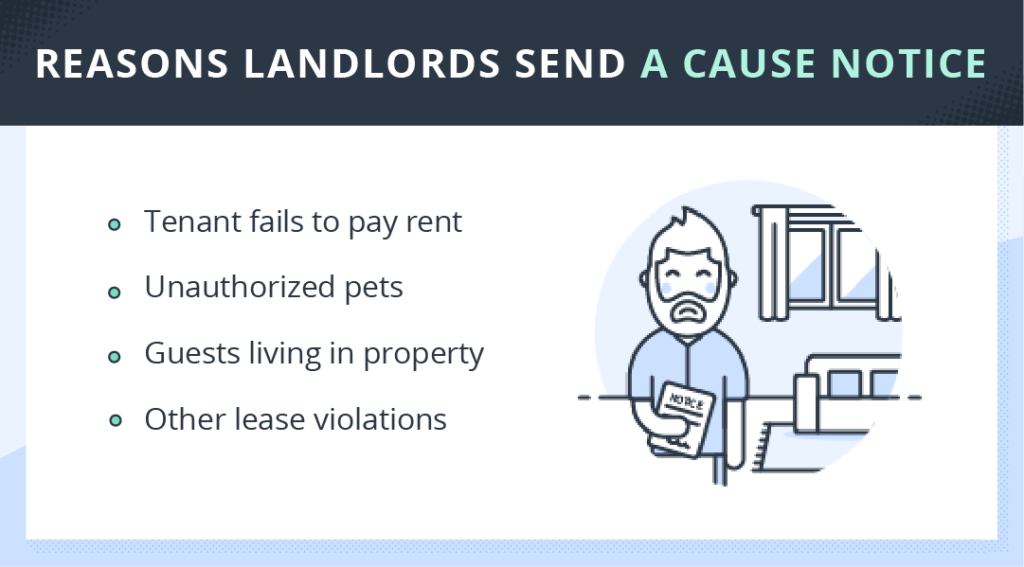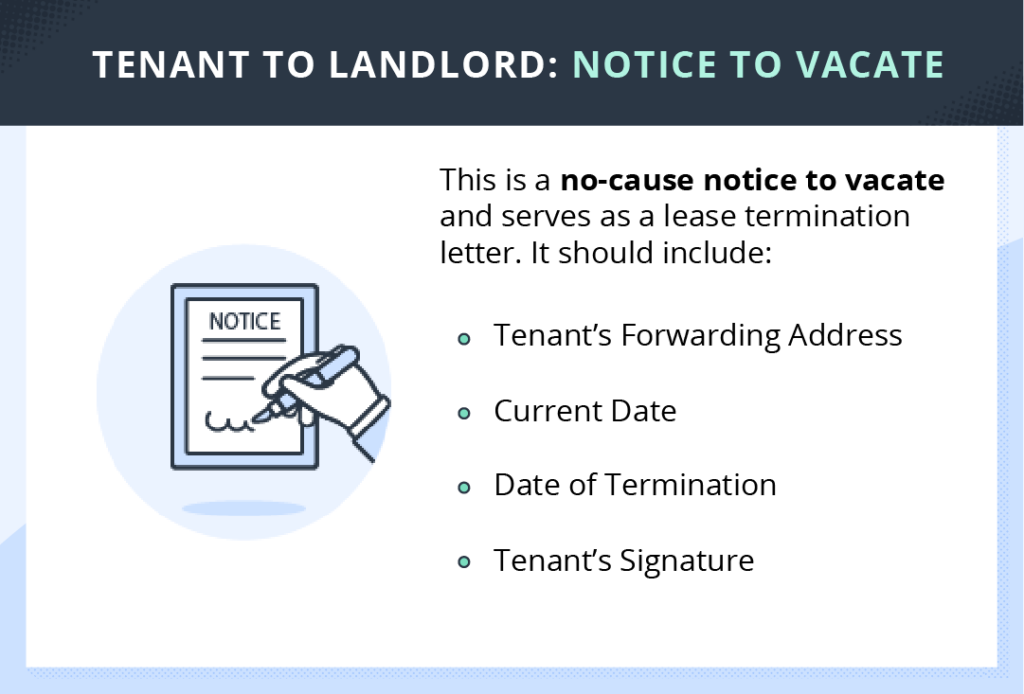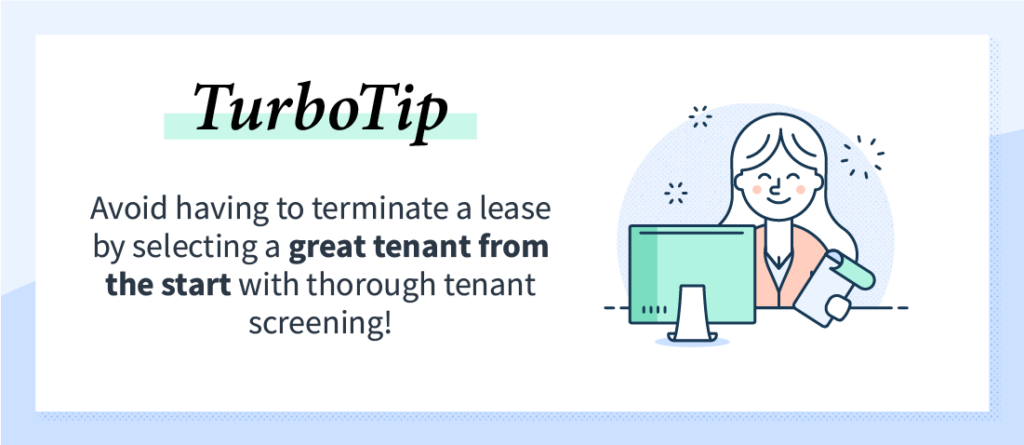The vacancy cycle is inevitable, whether a renter is moving on to buy a house, moving away to a different city, or the landlord is ready for a better-suited tenant. The term “notice to vacate” can refer to several different situations for landlords and tenants. In most states, landlords and tenants alike can send a no-cause notice to terminate the lease as long as a longer term isn’t in effect.
In addition, either party can give cause notice to end the rental agreement if the other has breached the contract. These terms can seem confusing, so it’s important to know the difference and to be educated on your local laws. Read on to learn about the four types of the most frequent notice situations landlords and tenants should know.

Tenant to Landlord: No-Cause Notice to Terminate
A no-cause notice from a tenant to a landlord serves as a lease termination letter. This notice to vacate is a written statement from a tenant to inform their landlord they won’t be renewing their lease and will move out of the rental property. In addition to a clause in your lease agreement, landlords should reach out to tenants before the lease renewal period to remind them how long they have to provide a vacancy notice.
Typically, landlords require a 30-day notice to vacate, but there might be a different time frame required by your local landlord-tenant state laws. Different lease types could also factor in the amount of notice required; a month-to-month lease agreement may require less notice than a long-term lease.
Pro Tip:
This notice is the most common and counts as no cause because there were no landlord violations – the tenant simply wants to move out. Renters should check the lease to see if a formal notice to vacate letter is required or if an email will work instead, but we recommend providing a written notice to vacate for legal purposes.
Landlord to Tenant: No-Cause Notice to Terminate
The next type of notice to vacate is similar to the above but comes from the landlord. This situation is uncommon because most landlords want to avoid vacancies and retain respectful tenants. However, you could send a no-cause notice to vacate if you want to move back into the rental, remodel, or try to sell the property. Most states allow no-cause notices, but some, like California, only allow landlords to ask tenants to vacate under specific circumstances. For example, if a building has demolition plans or the unit is being sold a California landlord can serve a no-cause notice, but they also have to inform the tenant of their right to relocation assistance or a rent waiver.
A no-cause notice to terminate is not an eviction notice. Eviction notices require their own process, which varies state from state.
Pro Tip:
Savvy landlords know that the best ROI stems from great tenants and consistent rent. If you’ve done proper tenant screening and you’ve found a tenant who is respectful and pays rent on time, pushing for a lease renewal is the ideal situation.
Landlord to Tenant: Cause Notice to Terminate

Cause notice to terminate from a landlord to a tenant occurs when the tenant has done something in violation of their rental agreement – such as failure to pay rent, unauthorized guests or pets, or other lease violations. This type of notice requires a specific reason and usually allows tenants a certain amount of time to “correct” the wrongdoing, for example:
- If a tenant fails to pay rent, landlords usually have to give them a few days to make the payment
- If the tenant has an unauthorized pet, the landlord could give notice that the lease would be terminated unless the tenant pays the pet deposit or removes the pet from the unit.
Certain violations you have to allow the tenant to correct; others you don’t, such as damaging the rental property. Remember, the amount of time and specifics vary from state to state so make sure to check your local laws.
A termination notice provides tenants information on when the lease will end if they do not correct the lease violation, but an eviction notice is given only after tenants remain at a property when their lease has already been terminated.
Tenant to Landlord: Cause Notice to Terminate
A cause notice to terminate the lease by a tenant to a landlord happens when the landlord is at fault. If you don’t fix problems that disrupt the warranty of habitability, then your tenant can give vacancy notice. Some examples of issues that would warrant a tenant’s notice to terminate include:
- Not fixing toilets
- A broken heater during winter
- Pest infestations
Each state has its own requirements regarding the time landlords have to make repairs. Further, the type of repair (critical or non-critical) dictates how much time you have to act. Critical repairs like a broken heater during the winter need to be taken care of typically within 3-7 days. An example of a non-critical repair would be a screen tear or noisy radiator, and this fix typically needs to be handled in 10-30 days.
How to Write a Notice to Vacate
While each notice to vacate letter will differ slightly, there are a few elements that should always be included, like:
- The tenant’s current address
- Reliable contact information
- A forwarding address for return of the security deposit
- The date they intend to terminate the rental agreement
- The current date (to ensure the notice deadline is met)
- Tenant’s signature
To help you in the creation of a notice to vacate, we’ve provided a sample letter. Please note that this sample letter is for informative purposes only, and you should seek professional legal advice to ensure you adhere to your state’s specific laws.
Sample Notice to Vacate:
[Date]
[Tenant’s Name]
Rental premises located at: [Full Address]
[Primary Phone Number] and [Secondary Phone Number]
Please be advised that the undersigned intends to terminate the lease agreement of the above listed premises on the [Month] day of [Date], [Year].
Choose one of the following to include in the letter:
- I plan to stay until the end of my notice period.
- I plan to move out prior to the end of my notice period. I understand that I am still responsible for my lease obligations through the end of the notice period. I plan to physically move out on [date].
I am leaving because… [Reason For Leaving].
I understand that a refund of my security deposit will be made as long as I:
- return all keys provided by the landlord,
- complete the required cleaning,
- pay rent in full to the date of termination,
- have caused no damages, other than normal wear and tear,
- owe no fees, utilities or other charges to the landlord,
- and have paid all other expenses I owe any 3rd parties, including utilities to the date of termination.
It is understood that a refund of any deposit will be forwarded to the address below, or if none is provided to the last known address.
Tenant Forwarding Address:
[Name]
[Full Address]
[Tenant Signature], [Print Tenant Name], & [Date]
Tips for Writing a Notice to Vacate & Other Things to Keep in Mind
Here are some tips to be proactive and prevent any unnecessary pain points in any vacancy circumstance:
- In the lease, make sure you are following state or local laws regarding how long the tenant has to give notice, and the way the notice can be given. For example, landlords in New York must give a 30-day written notice before terminating the lease.
- Landlords and tenants – always keep a digital copy of any vacancy notices. If the state or landlord requires the notice in writing,, be sure you photocopy the letter to keep for your records.
- Know how to communicate with your tenants so any problems can be resolved quickly.
- Tenants: keep in mind that submitting a notice to vacate letter isn’t the final step in moving out. You will still need to do a final walk-through with the landlord to document any repairs.
Unless the notice to vacate is no cause, you can avoid having to terminate the lease by selecting great tenants from the get-go. This means thorough tenant screening with a credit check, background check, and eviction history to ensure you have the best person for your rental.
Notice to Vacate FAQ
Can my tenant give notice in the middle of a lease?
Typically no, they’d need to wait until the end of the term of the lease to give you notice, unless you’re violating the lease or laws, in which case they could provide a notice for cause. Learn how to handle your tenant breaking the lease early in our blog.
Is a notice to vacate for cause the same as an eviction notice?
A notice to vacate for cause can kick off the eviction process. Check your local laws to understand what’s required in your state and county.
Can renters change their mind and take back their notice to vacate letter?
If a tenant has already given you their notice to vacate letter and you’ve found a replacement, then the agreement still stands and you are not legally obligated to allow them to stay. However, if you haven’t found a tenant replacement, you can consider working with the current renter to discuss lease renewal options.
How to get out of a 60-day notice to vacate?
Similar to the answer above, if a tenant has already served a notice to vacate letter or been served a notice to vacate letter by their landlord, it cannot be retracted. However, a notice can be withdrawn or the right to enforce it waived with the consent of the party to whom the notice is given.









